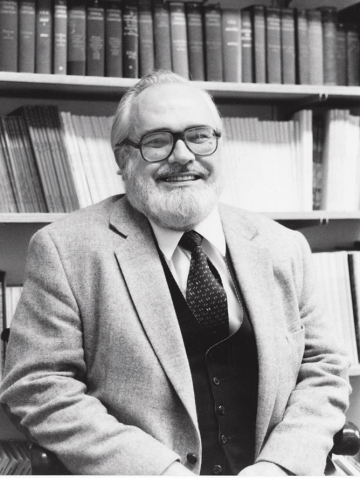Edwards Hobbs, professor of religion at Wellesley from 1981 to 2012, passed away on April 4. His scholarship concentrated on the hermeneutics, or interpretation theory, of Biblical texts. His teaching at the College focused on the New Testament, including courses on Jesus of Nazareth, the Apostle Paul, and the Gospel of Mark.
Edward was educated at the University of Chicago, where he took a B.A. in philosophy, theology, and history of culture and a Ph.D. in theology. His dissertation on The Book of the Judges of Israel was published in 1950 by the university’s press. He held early teaching appointments at Chicago and Southern Methodist University, where he edited a Festschrift for William Andrew Erwin. During those years, he also served as a frequent reviewer for the Journal of Religion.
In 1958, Edward was appointed professor of New Testament theology at the Church Divinity School of the Pacific, an Episcopal seminary in Berkeley, Calif. He also held concurrent appointments as professor of theology and hermeneutics at the Graduate Theological Union and professor of medicine at the University of California, San Francisco, Medical Center, where he taught philosophy of medicine.
At Berkeley, he founded the Center for Hermeneutical Studies in Hellenistic and Modern Culture and the Pacific Coast Theological Group and published numerous papers under their imprints. In 1974, he edited another Festschrift in honor of Sherman Elbridge Johnson. These publications helped to establish him as a guest lecturer much in demand at universities in the United States, the United Kingdom, and Germany. Shortly before coming to Wellesley, he published an essay entitled “Theology and the Arts” in Art, Creativity, and the Sacred, a widely read collection edited by Diana Cappadona-Apostolos.
Edward came to Wellesley as professor of religion in 1981. He chaired the Department of Religion during the late 1980s and for many years served as parliamentarian of Academic Council, the faculty legislative body. In 1983–84, he was appointed visiting professor of New Testament at Harvard Divinity School. The following year, he organized a symposium at the College honoring the centenary of the renowned New Testament theologian Rudolf Bultmann. He edited the symposium papers into a volume published in 1985 by Fortress Press as Bultmann—Retrospect and Prospect: The Wellesley Centenary Symposium. In 1987, Edward was honored as a guest chaplain of the U.S. House of Representatives; in 1990, he collaborated with Julian Boyd on Hermeneutical Cartography: A Modest Proposal, another publication of the Center for Hermeneutical Studies.
He devoted his later decades to the study of the Gospel of Mark, producing an unpublished book manuscript called “The Gospel of Mark: Transforming the Exodus Tradition.” He was working on it until his retirement in 2012, occasioned by complications from a stroke he suffered in the classroom while teaching his course on Jesus of Nazareth.
Edward was a deeply learned and convivial colleague, much sought after on campus for his vast knowledge of the ancient world, classical music, and wine. A highlight of his later years was a series of legendary wine dinners he hosted at the College Club that brought together Wellesley faculty with his friends outside the College. A man of leonine presence, passionate commitment, and immense intellect, we shall not see his like again.





We ask that those who engage in Wellesley magazine's online community act with honesty, integrity, and respect. (Remember the honor code, alums?) We reserve the right to remove comments by impersonators or comments that are not civil and relevant to the subject at hand. By posting here, you are permitting Wellesley magazine to edit and republish your comment in all media. Please remember that all posts are public.